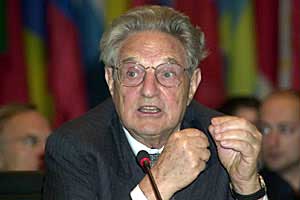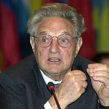
CAN RUSSIA TAKE ITS PLACE IN THE G8 FOR GRANTED?
Publication: Eurasia Daily Monitor Volume: 2 Issue: 34
By:

International financier George Soros has once again shown his unique talent as a newsmaker. In an interview with the Austrian Die Presse, he suggested expelling Russia from the G8 due to its retreat from democracy. The Russian media instantly jumped on the story (Izvestiya, February 15).
What is most surprising about this interview is that the fast-moving billionaire-philanthropist said essentially nothing new: the same proposal emerged from debates in the U.S. Congress in spring 2004, initiated by Sen. Joe Lieberman (D-CT), Sen. John McCain (R-AZ), Rep. Christopher Cox (R-CA), and Rep. Tom Lantos (D-CA) (Nezavisimaya gazeta, April 2, 2004). Despite the clearly bipartisan character of the Congressional initiative, the Russian Foreign Ministry dismissed that motion as “electoral games” (newsru.com, April 1, 2004). The issue appeared firmly closed by U.S. Secretary of State Condoleezza Rice, who asserted during her recent European tour that Russia was in a “difficult transition” and so excluding it from the G8 would be a “mistake” (Kommersant, February 15). Yet Soros has just challenged the State Department, and while it is entirely possible that he merely stated his own opinion, no one in Moscow’s political circles will believe that the message had no deeper meaning or hidden context.
Soros’ reputation in Russia is tremendous and hugely controversial. He is believed to have single-handedly triggered the August 1998 financial meltdown with a simple letter to the Financial Times. For the Kremlin authorities, he is the embodiment of the aggressive and all-penetrating U.S. imperialism that has had a hand in every Russian political setback. As Viktor Chernomyrdin, Russian ambassador in Ukraine, once said: “Where it smells like trouble, there is Soros” (Nezavisimaya gazeta, April 1, 2004). Indeed his contribution is seen as the decisive factor in Ukraine’s Orange Revolution.
The many aides and advisors in Putin’s administration who were educated in the KGB “academy” have much respect for the CIA, but for them Soros is an entirely different story. He is regarded as an NGO activist who has no fear of authority. It is just incomprehensible for the Kremlin that a “dissident” who gave more than a few million dollars to the anti-Bush campaign was not punished for his sins (Izvestiya, November 12, 2004). His support for Russian education and basic science is seen as a corrupting influence (Nezavisimaya gazeta, December 8, 2004). But his most evil plan — camouflaged as “democracy building” — is presumed to be a scheme to undermine Putin’s vertical power structure. This ambitious maverick has to be cut down to size, and Defense Minister Sergei Ivanov, speaking at the Council on Foreign Relations last month, asserted that the Russian government did not fancy receiving a salary from “foreign foundations” (gazeta.ru, February 15).
What puzzles and worries Putin’s lieutenants is that the network of Soros “agents of influence” is growing and even multiplying: from students using the Internet to pensioners protesting against “liberal” reforms, and from irritating journalists to noisy NGOs like the Committee of Soldiers’ Mothers. What is worse, many international organizations, instead of treating Russia with the respect proportional to its sheer size, have turned to “unconstructive” criticism increasingly resembling subversive activities. Last December, Moscow focused its counter-offensive on the OSCE, threatening to block the approval of its budget and thus prove that the organization could — in Putin’s words — “lose its very reason for existence (Kommersant, October 29, 2004). In February, it was the Council of Europe that was “taught a lesson” when its Secretary-General, Terry Davis, received a cold shoulder while visiting Moscow (Vedomosti, February 15). Perhaps the Russian Foreign Ministry expects the EU to take note of these demarches and soften its position before the May summit in Moscow, but the emerging alliance of smaller states and former Soviet satellites in the EU makes it very hard for Germany to insist on its “see-no-evil” attitude toward Russia (gazeta.ru, February 10).
In all that estrangement and tension, the G8 appears to be one place where Russia feels comfortable. Thus Mikhail Margelov, the head of the Federation Council Committee on International Affairs, asserts with confidence that “whether Soros likes it or not, Russia belongs there due to its strategic position, economic importance, and military weight” (Vedomosti, February 15). It may be not entirely true, since the fundamental purpose of this exclusive club is to solve the world’s problems, while Russia, with its unique profile of nuclear petro-state, is more of a problem-maker. Feeling the need to cover this deficiency, Putin has replaced the too independent-minded Andrei Illarionov with Igor Suvalov as his man at the G8 (polit.ru, January 31). Now, Putin is confident that no unpleasant surprises regarding his membership in this club will be raised at the upcoming summit with President George W. Bush in Bratislava, where he hopes to have another “heart-to-heart” talk with the U.S. President and rebuild U.S. confidence without playing his last trump card, which has three words on it: “Iraq, Russian troops.”
There is, however, one possible twist in this tale, a change that is strongly advocated by Canadian Prime Minister Paul Martin: the establishment of a new international, top-level Group of 20. This expanded club would have the same membership as the existing Group of 20 ministers of finance and would involve the leaders of China and India, Brazil and Mexico, and even Saudi Arabia (see www.g20.org). This idea makes enough political sense to gain significant momentum, even if President Bush remains uncommitted. Inside this larger body there will probably be a need in a smaller group, perhaps as narrow as the United States, Britain, France, Germany, and Japan.
Soros might have a point, after all.




